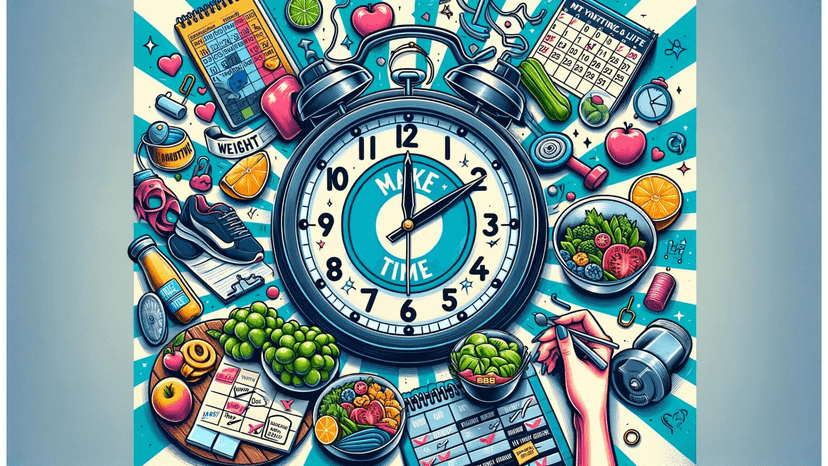Will 75 hard help with my weight loss?

Introduction to the 75 Hard Program
75 Hard program is a transformative health protocol that focuses not just on physical health, but also mental toughness. Brought to life by entrepreneur Andy Frisella, the 75 Hard program was designed to reshape the way one thinks about diet, exercise and dedication in the face of challenges.
Overview and Origins of 75 Hard
Born from a desire to cultivate mental resilience while improving physical health, the 75 Hard program is more than just a weight loss plan. Its primary aim is to enhance discipline, fortitude, and self-control. Andy Frisella, the man behind the program, conceptualized this strategy while going through his own weight loss and self-transformation journey. The program, despite being tough, promises considerable results for those committed enough to see it through.
Core Components and Rules
To make it easier to understand, let's dissect the program into its core components:
-
Diet: The program requires you to stick to a diet plan – any diet of your choosing – for 75 days straight with no cheat meals allowed.
-
Exercise: A regimen of two daily workouts is prescribed, each lasting at least 45 minutes. Interestingly, one of them must be performed outdoors, irrespective of the weather conditions.
-
Reading: Participants must read 10 pages of a non-fiction or self-help book per day, promoting self-growth and mental stimulation.
-
Water Intake: Daily consumption of a gallon of water is another critical requirement of 75 Hard, highlighting the important role hydration plays in overall health.
-
Progress Picture: Lastly, participants need to take a daily progress picture to visually track their transformation and maintain transparency in their journey.
Expectations vs. Reality
Though the program rules may seem quite stringent, they are aimed at fostering discipline and mental toughness even when the going gets hard. While it's easy to envision that with strict adherence to these rules, significant weight loss is guaranteed, it's important to remember there's more to the 75 Hard challenge than just shedding pounds. It is a brutal test of tenacity, willpower, and resolve; and not every day will be easy.
Yes, you will undoubtedly become healthier, lose weight, and improve fitness, but more significantly, you'll learn to push your boundaries, manage discomfort, and hold yourself accountable. But always remember: every individual's journey is unique, and outcomes can vary greatly based on a multitude of factors including metabolic rate, overall health status, diet and exercise intensity, among others.
In closing, the 75 Hard program is indeed a significant commitment but it compels one to embrace a healthier lifestyle and a resilient mindset, contributions that go way beyond just weight loss. Next, we'll specifically look into how 75 Hard affects weight loss, and what scientific evidence says about its effectiveness. This understanding will help you determine if this program is the right fit for your personal health and fitness goals.
Analyzing 75 Hard's Approach to Weight Loss
75 Hard is a unique program designed for transformative change, not solely for weight loss. This program drills deeper into the realms of physical and mental discipline, engaging you in physical activities and certain eating habits. What makes 75 Hard different is that it pushes you not only to adopt healthy habits but also to maintain them, steadily, over a period of 75 days.
The Role of Exercise in 75 Hard
The 75 Hard program demands two 45-minute workouts every day, with one workout mandated to be outdoors. This is a non-negotiable component of the regimen. Substantial physical effort is required to fulfill the program's demands, which could lead to a considerable amount of calories being burned.
Research has shown evidence of the direct correlation between regular exercise and weight loss. The National Weight Control Registry (NWCR), a log of persons who have lost a significant amount of weight and managed to keep it off, reports 94% of their registrants increased their physical activity, with the most commonly reported form of activity being walking. This demonstrates the critical role that exercise plays in long-term weight management.
However, one should be cautious. The program's high-demand physical activity, if not scaled according to one's current fitness level, could result in injury or burnout. Therefore, it is indispensable to alter the intensity of the routines to match your comfort and fitness levels.
Dietary Guidelines and Nutritional Impact
The 75 Hard program suggests following any diet that is designed to improve your health. However, it insists on complete abscondance from alcohol and cheat meals for the entire duration. Proper dietary habits are key to weight loss and overall health. The Center for Disease Control and Prevention (CDC) reports that choosing a diet high in fruits and veggies can help with weight loss and management.
The advantage here is the freedom to choose a dietary plan that suits your lifestyle and food preferences, as long as it aims to improve your health. However, this also brings along a pitfall, as the absence of a standardized dietary protocol might lead to individuals choosing restrictive diets that are hard to maintain in the long run and not balanced in terms of needed nutrients.
Mental Discipline and Weight Loss
Perhaps the most distinguishing factor of the 75 Hard program compared to others is its emphasis on mental discipline. The program includes daily reading of self-improvement literature and the taking of progress pictures. Both activities aim to develop a stronger sense of self-discipline, self-confidence, and a positive self-image.
Several studies, like the one published in the Journal of the Academy of Nutrition and Dietetics, have shown that factors such as self-efficacy and a positive self-image play critical roles in successful weight loss and maintenance.
In conclusion, the 75 Hard program could potentially be beneficial for weight loss through its structured approach to exercise, diet, and mental discipline. While some aspects of this program may be beneficial, it also has potential drawbacks and should, therefore, be undertaken with a clear understanding and skills for adaptation based on individual needs and contexts. Help from a fitness professional or registered dietitian may be beneficial. As in any health or weight loss journey, it's not about quick fixes, but adopting long-term, sustainable behaviors.
Considerations and Alternatives for Sustainable Weight Loss
The 75 Hard program is often advertised as a sure-fire way to lose weight, get fit, and utterly transform one's life in a relatively short span of time—about two and a half months. However, an evidence-based analysis reveals that this program is not without its potential risks and challenges, particularly regarding the sustainability of its effects and its impact on an individual's health.
Potential Risks and Challenges
Even as the 75 Hard program prescribes a rigid regimen of daily exercises, strict dieting, and self-development activities, experts in the field of health and fitness raise concerns about the program's long-term efficacy and safety. One of the most notable of these concerns is the potential for overtraining. The 75 Hard program recommends two 45-minute workout sessions each day, with one of them outdoors, irrespective of the weather conditions. This kind of intensive regimen, especially without adequate rest, can potentially lead to burnout, injuries, or other health-related setbacks—particularly for those who are relatively new to regular exercise.
The program's dietary aspect is another point of concern. While consuming a balanced diet and maintaining a calorie deficit is crucial for weight loss, the 75 Hard program's "no cheat days and no alcohol" rule could potentially set off unhealthy dietary habits and patterns that extend beyond the program's duration. It’s key to remember that moderation, not deprivation, usually leads to lasting healthy habits.
Sustainable Alternatives to 75 Hard
So, what could be more effective and safer alternatives for someone seeking to lose weight and improve their fitness levels sustainably? Here are a couple of strategies backed by scientific research and experts in the field.
Firstly, consider incorporating regular moderate-intensity exercise into your routine. Recommendations from the Center for Disease Control and Prevention suggest at least 150-300 minutes of moderate-intensity aerobic exercise or 75-150 minutes of vigorous-intensity aerobic exercise per week, along with muscle strengthening activities on 2 or more days a week. This approach not only reduces the risk of overtraining but also promote sustainable, long-term adherence to regular physical activity.
In terms of diet, consider focusing on changing dietary habits for long-term sustainability rather than adhering to a strict "no cheating, no alcohol" rule. This could include consuming more fruits, vegetables, whole grains, lean proteins, and healthy fats while limiting intake of processed foods, sugary drinks, and high-fat and high-sugar snacks. It’s also key to remember that having a 'cheat day' is not necessarily a bad thing— in fact, it can even aid in mental sustainability for the diet.
Building a Personalized Weight Loss Plan
Perhaps the best approach for sustainable weight loss is building a personalized plan that takes into account your unique need, lifestyle, preferences, and limitations. To this end, working with a registered dietitian or a certified personal trainer can be extremely helpful. They can help you set realistic goals, develop a balanced eating plan that you enjoy, create an individualized exercise regimen, and foster a healthy relationship with food and exercise. In the end, the best plan for weight loss is the one you can sustain in the long run.
In conclusion, while the 75 Hard program might promote short-term weight loss, its sustainability and long-term effects on your health remain questionable. More importantly, remember that weight loss is a journey that doesn't need to be 'hard' or punishing. It’s better approached with patience, care, and a focus on overall health rather than a singular focus on the scale.
In Summary
This blog post introduces and unpacks the 75 Hard Program, a unique fitness and mental toughness regimen designed by Andy Frisella. This program focuses not only on weight loss and physical improvement, but also on the cultivation of mental resilience and discipline through a strict regime of diet, exercise, self-education, hydration, and progress tracking.
The 75 Hard Program goes beyond the conventional approaches to weight loss. It implements exercise, diet, and mental discipline to achieve transformative change. While research supports the positive effects of regular exercise, a healthy dietary plan, and a sustained positive self-image on weight loss, the 75 Hard program's extreme approach may present risks such as potential overtraining, potential development of restrictive dietary habits, and methods that may not be sustainable long term.
To implement a similar yet more sustainable approach, we suggest the following action steps:
-
Balanced Exercise Routine: Incorporate regular moderate-intensity exercise into your routine. Aim for at least 150-300 minutes per week of moderate-intensity exercise or 75-150 minutes of vigorous-intensity exercise, with added muscle-strengthening activities.
-
Healthy Diet: Opt for a diet rich in fruits, vegetables, lean protein sourcing, and whole grains, while reducing intake of processed foods, high sugar, and high-fat food items. Remember moderation is key.
-
Mental Discipline: Continue to cultivate mental resilience and discipline through self-education or personal development resources, and consider exploring mindfulness practices.
-
Progress Tracking: Consistently track your progress, but not just in terms of weight. Monitor improvements in strength, energy levels, sleep patterns, and mental clarity.
-
Professional Consultation: Consider consulting with a fitness professional or registered dietitian to help create a personalized plan that fits your personal needs, preferences, and lifestyle.
Remember, sustainable weight loss and fitness are more about long-term lifestyle changes than quick fixes and enduring extremes. Regardless of the plan or program you choose to follow, ensure it promotes healthy, achievable, and maintainable strategies for overall health and well-being.




